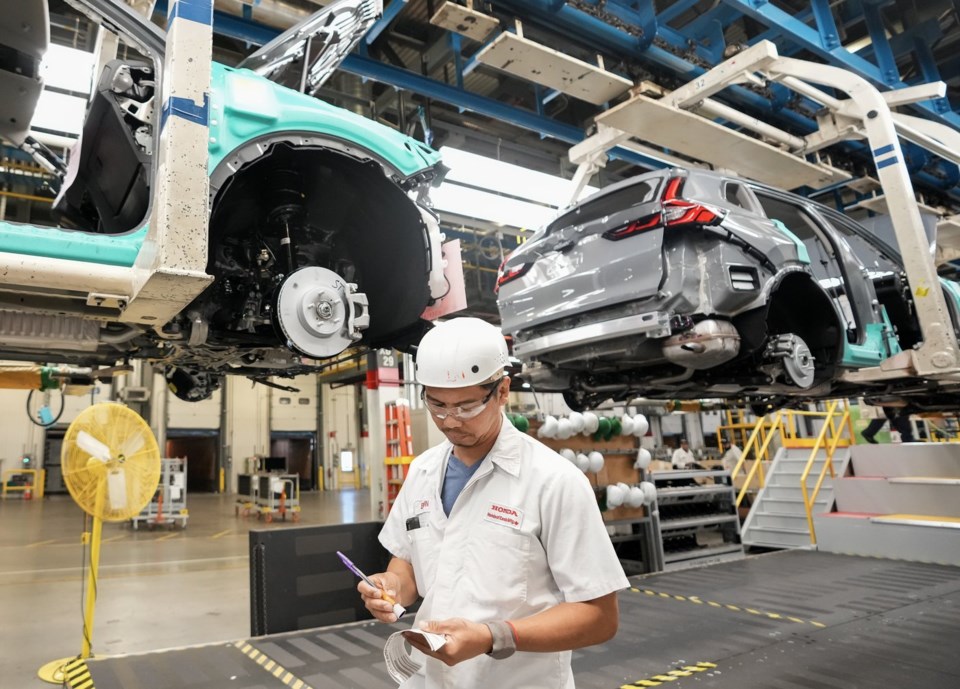TORONTO — Honda is not shifting any Canadian production to the United States, at least not for now, the company said Tuesday in response to a report that it was considering such a move.
Japan's Nikkei financial newspaper reported earlier in the day that Honda was looking to shift enough Canadian CR-V and Civic production to the U.S. so that it could meet 90 per cent of U.S. sales with vehicles produced there.
The automaker was reported to be considering the move because it faces some US$4.6 billion a year in tariffs on the 500,000 vehicles it imports into the U.S., including 300,000 from Canada.
Before April 3, those vehicles entered the U.S. tariff-free.
But while Honda and all other importers face new, steep costs, the company intends to maintain current levels of Canadian production, said spokesman Ken Chiu.
"We can confirm that our Canadian manufacturing facility in Alliston, Ont., will operate at full capacity for the foreseeable future and no changes are being considered at this time."
Honda's comments confirm what government officials had said earlier in the day: that no changes are in the works for Honda's operations, which employ around 4,200 people and produced about 375,000 CR-V and Civic vehicles in 2023.
The company also produces the same models in the U.S., where the Nikkei reported the company was looking to hire more workers and add shifts. Honda said it couldn't comment specifically on what was in the report.
Federal Industry Minister Anita Anand said earlier she had been assured by Honda there were no changes happening. She later said she'd met Tuesday with the head of Honda Canada, who she said confirmed the automaker is committed to its Canadian operations.
Ontario Premier Doug Ford and his office said Honda told them the company does want to increase production in the U.S., but not at the expense of Canadian production.
While Honda has said no changes are in the works, industry experts have warned the new tariffs will force companies to cut back production and lay off workers because the financials don't work with the added costs.
Stellantis, for example, announced a temporary production halt at its Windsor, Ont. plant, plus more in the U.S. and Mexico, the day the tariffs went into place.
And GM last week also announced a temporary halt at its Ingersoll, Ont. plant, though the company says that is directly due to lower than expected demand for the electric vehicle delivery van it produces there.
Toyota Canada, which produced almost 534,000 vehicles in Canada last year, has said it has no plans to change its production in the foreseeable future.
Prime Minister Mark Carney said at a campaign stop Tuesday that U.S. President Donald Trump's tariffs are an attempt to "pull apart" the integration of North America's auto industry.
“We are seeing some of the impacts in the short term of that with layoffs for some of our automakers, potential shifts in production."
Carney said he doesn't think the Trump administration is taking into account how integrated the industry is and that it will likely have to make permanent the currently temporary tariff exemption on auto parts from Canada.
In an effort to lessen the hit to the auto sector in Canada, the federal government on Tuesday announced that producers that maintain their production levels in Canada would be able to import a certain number of U.S. assembled vehicles into Canada free of tariff countermeasures.
The move comes as Mazda confirmed it was halting production of Canada-bound CX-50 vehicles at its Alabama plant because they're subject to Canada's counter-tariffs.
Conservative Leader Pierre Poilievre condemned Trump’s “unfair targeting of Canada” while saying that Canada's counter-tariffs should remain in place.
NDP Leader Jagmeet Singh said Canada should implement rules preventing automakers from selling vehicles in Canada if they don't have a manufacturing presence here.
The tariffs raise questions not only about existing production, but also the tens of billions in electric vehicle production commitments various automakers have made.
Last year, Honda announced a $15-billion commitment to its Canadian operations to create an electric vehicle supply chain in Ontario. The plans, supported by up to $5 billion in public funds, include building an electric vehicle battery plant next to its existing Alliston plant.
Ontario Economic Development Minister Vic Fedeli, who is set to leave Sunday for Japan on a previously scheduled trip to meet with Honda, said he is confident in the future of all of the electric vehicle investments the province has attracted.
He does not believe the next federal government could undo the funding and tax credit promises that attracted Honda here, he suggested.
“I believe they’re contractually obliged,” Fedeli said.
While automakers struggle with how to respond to the added costs of tariffs, they're also having to figure out how long they might be in place and what could change next.
On Monday, for example, Trump floated another possible pause on automobile tariffs to help automakers adjust, but there was little detail, or certainty, on what those changes might be.
— With files from Allison Jones, Liam Casey, Kyle Duggan, Nick Murray and David Baxter
This report by The Canadian Press was first published April 15, 2025.
Ian Bickis, The Canadian Press




